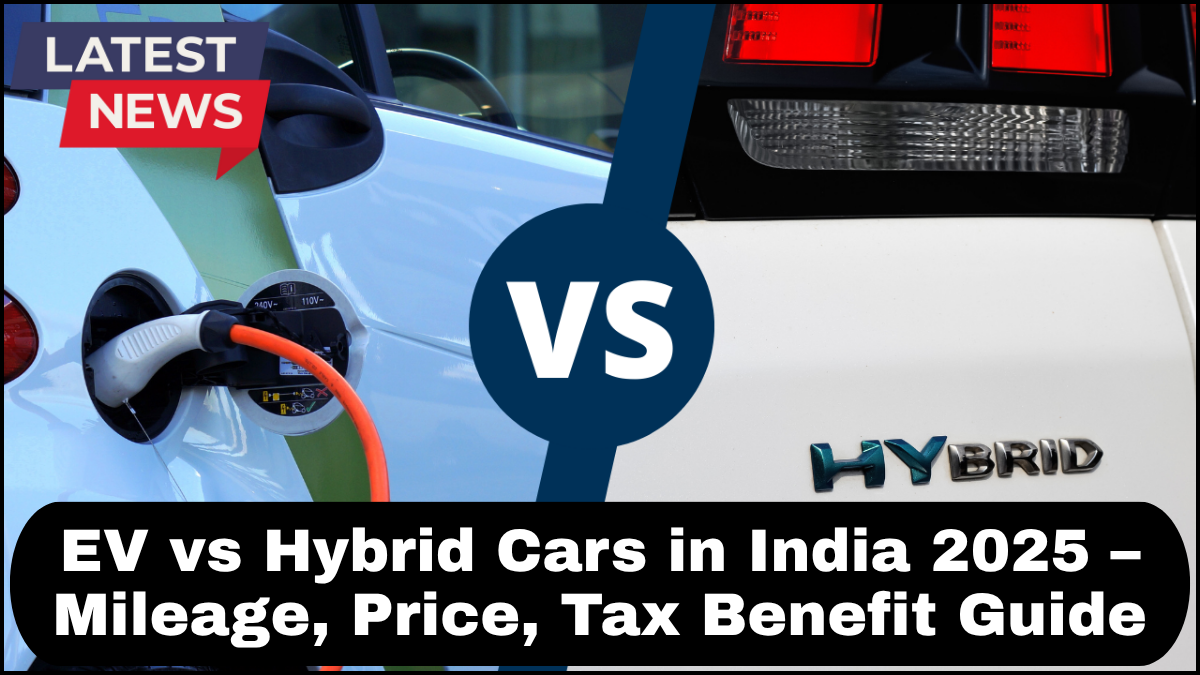As India pushes ahead with its green mobility goals, consumers are increasingly asking: Hybrid Cars vs EVs 2025 – which is better? With rising fuel prices, stricter emission norms, and government incentives, the Indian car buyer now faces a complex decision. This guide breaks down the critical differences in cost, efficiency, mileage, and tax benefits to help you choose the right vehicle in 2025.

What Are Hybrid and EV Cars?
Before comparing, it’s essential to understand the basic difference:
-
Hybrid cars combine an internal combustion engine with an electric motor. They use regenerative braking to charge the battery and offer better fuel efficiency without the need to plug in.
-
EVs (Electric Vehicles) run purely on electricity and must be charged using a home or public charging station. They produce zero tailpipe emissions.
Mileage Comparison in 2025
In India, mileage remains a deciding factor. Here’s what you can expect in 2025:
-
Hybrid Cars: Modern hybrids such as the Toyota Hyryder or Honda City Hybrid offer 22–27 km/l, depending on the model and driving conditions. They are ideal for city and highway use, where the electric motor reduces fuel consumption.
-
EVs: Battery electric vehicles like the Tata Nexon EV or MG ZS EV have a range of 250–520 km per charge, depending on the battery size. While their mileage is measured in km/kWh, the cost-per-km of running an EV is significantly lower—roughly ₹1 to ₹1.5/km, compared to ₹5 to ₹6/km for petrol hybrids.
Verdict: Hybrids give more consistent mileage across terrains. EVs cost far less per kilometer but need regular charging infrastructure.
Cost and Efficiency Analysis
Let’s talk upfront purchase and running costs:
-
Cost (2025):
-
Hybrid Cars typically cost more than petrol versions but less than EVs. Prices start around ₹15 lakh and can go up to ₹30 lakh depending on features and brand.
-
EVs have higher initial costs due to expensive battery components. Entry-level EVs now start at ₹12 lakh, while premium models can cross ₹35 lakh.
-
-
Efficiency:
-
Hybrids are fuel-efficient and require less battery maintenance.
-
EVs are energy-efficient with minimal mechanical parts, reducing long-term maintenance and running costs.
-
Verdict: Hybrids are more affordable upfront. EVs make up the price gap over time with lower running costs and fewer service expenses.
Tax Benefits and Incentives (2025 Updates)
Government policies in India favor green vehicles. Here’s how they differ:
-
EVs:
-
Eligible for FAME II subsidies (₹10,000 per kWh battery capacity for two-wheelers and cars).
-
GST on EVs is only 5%, compared to 28% on petrol and diesel cars.
-
Income tax deduction under Section 80EEB allows up to ₹1.5 lakh on loan interest for EV buyers.
-
Many states like Maharashtra and Delhi offer additional rebates and road tax exemptions.
-
-
Hybrids:
-
No central subsidy under FAME II.
-
GST is 28% + cess, making them less attractive tax-wise.
-
Some states provide partial road tax benefits for strong hybrids.
-
Verdict: EVs clearly win on the tax benefit and incentive front. Hybrids get minimal support in comparison.
Charging vs Refueling – Infrastructure & Convenience
-
EVs require accessible charging stations, which are still growing in India. Urban areas are well-equipped, but rural access remains patchy.
-
Hybrids don’t need plug-in charging. They use fuel and automatically manage the electric motor through braking and engine operation.
Verdict: Hybrids are more convenient for users without access to reliable charging infrastructure. EVs are ideal for metro-based users with home or public charging access.
Which Should You Buy in 2025?
Here’s a quick breakdown based on your priorities:
| Priority | Best Choice | Why |
|---|---|---|
| Lower purchase cost | Hybrid | Cheaper than most EVs |
| Low running cost | EV | ₹1/km vs ₹5–6/km in hybrids |
| Tax savings | EV | Section 80EEB + lower GST |
| Long drives | Hybrid | No range anxiety, no charging hassle |
| City use | EV | Ideal for daily commutes with zero emissions |
Future Outlook: Hybrid Cars vs EVs 2025 and Beyond
With stricter emissions norms like CAFE II and India’s push for electrification, EVs will dominate in the long run. However, hybrids remain a practical bridge—especially for those hesitant to go fully electric. Automakers like Toyota, Maruti, and Honda are doubling down on hybrids, while Tata, Mahindra, and Hyundai lead the EV front.
Battery prices are falling, charging infrastructure is expanding, and resale value for EVs is improving. By 2027–28, EVs may outpace hybrids in most aspects, but in 2025, the choice depends on your location, budget, and lifestyle.
FAQs – Hybrid Cars vs EVs 2025 India
Q1. Are EVs cheaper to maintain than hybrids?
Yes, EVs have fewer moving parts, no oil changes, and minimal servicing needs, making them cheaper over time.
Q2. Which is better for long drives in India – EV or hybrid?
Hybrids are better for long-distance travel due to fuel availability and no charging needs.
Q3. Can I get government benefits if I buy a hybrid car in 2025?
Not at the central level. Some states may offer limited road tax reductions, but major subsidies are reserved for EVs.
Q4. Which lasts longer – an EV or a hybrid?
Both can last over 10 years with proper maintenance. However, battery degradation in EVs should be monitored after 7–8 years.
Q5. Should I wait or buy now?
If you live in an urban area with solid charging infrastructure, go for an EV. If not, a hybrid is the safer bet in 2025.
click here to learn more